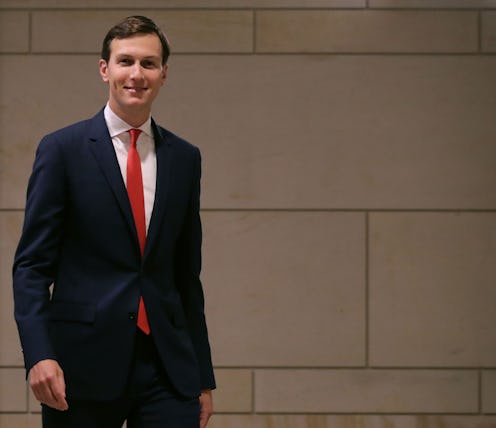News
Of Course These Interns Leaked Jared Kushner's Speech After The White House Told Them Not To

Jared Kushner, the president's son-in-law and advisor extraordinaire, spoke to a group of Congressional interns on Monday as part of a summer lecture series. As has become predictable for the Trump administration thus far, an unidentified intern recorded Jared Kushner's speech and promptly leaked it to Wired, the day after interns had previously leaked other parts of his comments to Foreign Policy.
Before Kushner started speaking, deputy staff director for Member Services, Outreach & Communications Katie Patru warned the assembled interns not to record or leak the speech. "To record today’s session would be such a breach of trust, from my opinion," Patru said. It didn't seem to make much of a difference.
In an administration where recently-fired Communications Director Anthony Scaramucci told a reporter he wanted to "kill all the leakers" (among other more flowery language he used), it's especially ironic for even conversations about the need to prevent leaking to get so promptly leaked.
Of course, beyond watching the Trump administration try to plug the leaks in a waterfall, it's important to look at what Jared Kushner, one of the most trusted advisors of the leader to the leader of the free world, actually told those interns. The recording obtained by Wired includes Kushner's comments on the Israeli-Palestinian conflict, one of the most thorny issues in foreign policy, and one that 36-year-old Kushner has taken flak for having been assigned to solve.
When asked about the conflict and his hopes for reaching a solution, Kushner said that it is a "very emotionally charged situation," and that "not a whole lot has been accomplished over the last 40 or 50 years we've been doing this." Kushner did not express any specific insights about what might be different now or why he and the Trump administration might have success where every American president has failed since Israel's founding in 1948, but he did express hope that the two sides could work together, and that the lack of leaks in negotiations over metal detectors at the Temple Mount/Al-Aqsa Mosque complex was a good sign for potential trust between the parties.
Kushner has also taken flak for saying "We don’t want a history lesson. We’ve read enough books. Let’s focus on how do you come up with a conclusion to the situation." It's an odd statement coming from a man seen as a novice in politics (elsewhere in the talk, he claimed that the Trump campaign was too disorganized to collude with the Russian government) who has no experience in an issue so difficult.
Kushner has already taken criticism on the Israeli-Palestinian issue for seeming to be a staunch pro-Israel advocate rather than an honest broker. He has personally known and supported Israeli Prime Minister Netanyahu for decades, and a recent meeting with Palestinian President Mahmoud Abbas reportedly left the Palestinians furious, feeling that they "sounded like Netanyahu's advisers and not like fair arbiters."
Kushner still has a long way to go before he could become the "fair arbiter" that might solve even a side of the Middle East's rubik's cube. And as he points out, leaks can harm the ability of the various sides to trust each other. While there was nothing especially damaging in the remarks Kushner made to the interns, the speed at which they got leaked suggest that this White House has a long way to go before it can prove itself as an arbiter worthy of being trusted.